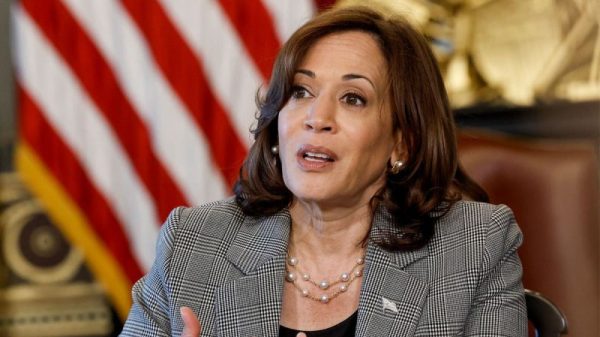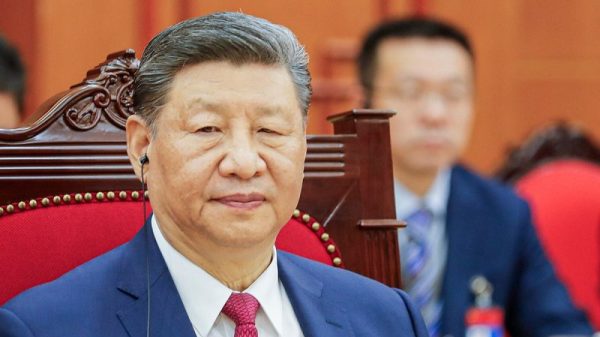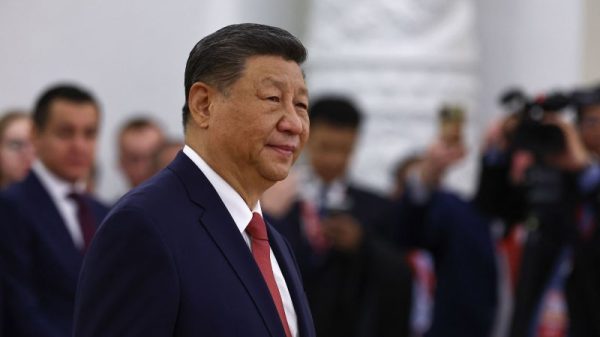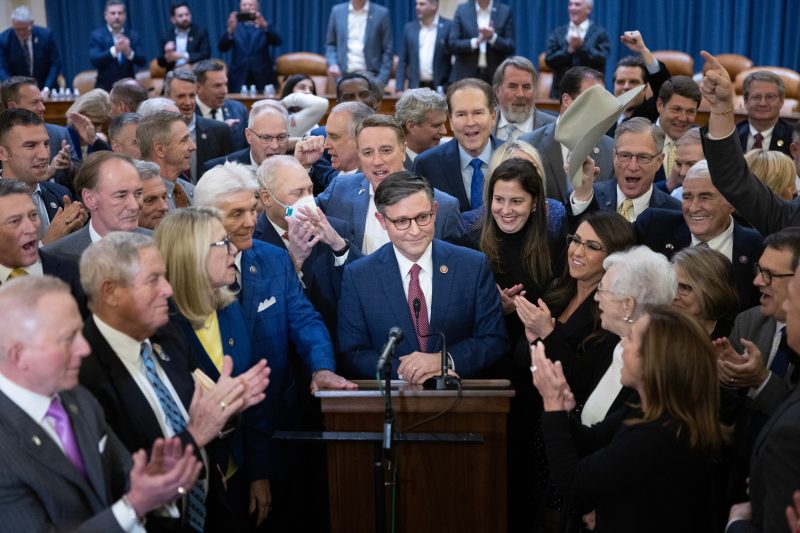The House Republicans were giddy, boisterous, maybe a little punch-drunk after a lengthy day — at the end of a lengthy several weeks — spent trying to select a new leader for their party’s conference. They had at last landed on one, Rep. Mike Johnson (R-La.), and crowded around him as he answered questions from reporters.
One came from ABC News’s Rachel Scott.
“Mr. Johnson,” she began, “you helped lead the effort to overturn the 2020 election results —”
Johnson began shaking his head, a disappointed look on his face. His colleagues around him began to groan.
“ — do you stand by—” Scott continued, but by then the conference members had decided that no such line of questioning would be allowed.
Loud boos. House Majority Leader Steve Scalise (R-La.), at one point his conference’s selection for the speakership, laughed. Rep. Virginia Foxx (R-N.C.) mockingly told Scott to “shut up” more than once.
Johnson turned his attention away. “Next question,” he said.
Scott didn’t get an answer to her question — though, of course, in a sense she did. But she also managed to unintentionally expose the central reason that the party has taken so long to unify around a leader: It’s still torn between two factions, one beholden to Donald Trump and his politics, and the other not.
As the history books will note, Johnson was the second person nominated to serve as speaker by his party’s conference. Not the second person in total; that number is now up to four in the three weeks since Speaker Kevin McCarthy (R-Calif.) was removed from his position thanks to a motion brought by right-wing Rep. Matt Gaetz (R-Fla.). Johnson was the second nominee on Tuesday.
A few hours earlier, the caucus had settled on Rep. Tom Emmer (R-Minn.), someone generally viewed as acceptable to enough of the party’s two poles to manage the harder task of winning a majority of votes cast by the full House. But Emmer’s forward progress came to a sudden halt, thanks in part to Trump.
Emmer had done the ring-kissing that is expected of Republican congressional leaders. (McCarthy’s trip to Mar-a-Lago in early 2021 is by now the stuff of legend.) But suddenly Trump weighed in against his candidacy, hard. Emmer, the former president wrote on social media, was a RINO, a Republican-in-name-only — a pejorative that Trump generally uses not to reflect a person’s politics but their personal loyalty.
His bid for the speakership had other obstacles, certainly; other legislators, mostly ones closer to Trump, offered criticisms of Emmer’s tenure and views. We are in an era where legislative histories are often stripped of context and converted to litmus tests, and this was quickly deployed against Emmer. But it’s hard to believe that had Trump offered a full-throated endorsement of Emmer this wouldn’t have been more muted.
After all, this wasn’t Rep. Jim Jordan (R-Ohio), the fringe-right megaphone who had been Trump’s initial pick for the job. The opposition McCarthy faced on the House floor in January was generally from his party’s more conservative wing, from legislators whose districts had voted more heavily for Trump in 2020. When Jordan was the nominee for speaker, though, the opposition came from the other side, from less-conservative legislators in districts Trump had won more narrowly or even lost.
Those less-conservative members of the caucus who blocked Jordan weren’t likely to dig in as much against someone who was closer to McCarthy. But the more conservative ones, given the space to do so by Trump, certainly were.
One of those who had ultimately voted against Jordan, Rep. Brian Fitzpatrick (R-Pa.), told reporters about one of the issues that was cited in opposition to Emmer: his failure to vote to reject electors for Joe Biden in January 2021.
This did, in fact, put Emmer in the minority in his conference. Most Republicans who currently serve in the House voted to reject the electors submitted by Arizona or Pennsylvania — not because there was evidence that those states awarded Biden their electoral votes incorrectly but as a demonstration of fealty to Trump’s unrelenting insistence that he’d won the election.
They voted to reject those electors in the hours after the Capitol riot; they took the position that the intended aim of the rioters — subverting the election results — was good, even if the tactics put their own lives at risk.
Scott asked about this at the GOP’s celebratory news conference because Johnson was central to the House effort to call the election results into question. In December 2020, shortly before the electors were formalized and sent to Washington to be counted, Johnson led the effort to get Republican legislators to join an amicus brief in support of a particularly ridiculous legal challenge to the results. (The Supreme Court rejected it out of hand.)
At the time, the New Yorker’s Issac Chotiner asked Johnson about that effort, Chotiner at times deploying sarcasm to press the legislator. Johnson insisted that his objections were centered on offering Trump legal pathways to elevating questions about fraud — questions that, even at that point, had been almost entirely adjudicated. He also suggested that his effort was meant to press the court to allow state legislators freer rein in appointing electors, something he said was “hang[ing] over the election cycle this year.” (“It didn’t come up in the debates, but it was the underlying issue,” Chotiner wryly observed.)
“I say this for Americans of both parties or any party, or whoever they voted for: we all should have an interest in these very specific clauses of the Constitution being followed,” Johnson said at one point.
“That was a big thing about why people supported Trump originally — the importance of following the Constitution closely,” Chotiner replied.
Missing the dig, Johnson agreed.
“Sure, sure. Exactly,” he said. “As an aside, I was on a radio interview this morning and was asked, “What do we do now? Don’t we need to beat them at their own game?” And what is implied is, “They cheated; we need to cheat better than they do.” And my response is, “Wait a minute. We are supposed to be the Party that stands for the rule of law.”
In a different radio interview the month before, Johnson had offered his thoughts on these alleged cheaters.
“It is evil. I mean, look, the integrity of our election system in our constitutional republic is an essential foundation of making our system work,” he said. “And when people lose their faith in those foundations and our institutions of government, then they just want to resolve their disputes in the streets.”
Fast-forward to January 2021, after more weeks without evidence of fraud but with escalating anger and rhetoric from Trump. On the morning of the Jan. 6 riot, Johnson shared his plan to serve as the point of the sitting president’s spear on the House floor.
We MUST fight for election integrity, the Constitution, and the preservation of our republic! It will be my honor to help lead that fight in the Congress today.
The statement I drafted summarizes our position and the legal analysis that supports it. https://t.co/JRfV1asZZz
— Rep. Mike Johnson (@RepMikeJohnson) January 6, 2021
His argument was not that the election was stolen through acts of evil. It was that the expansion of access to voting that accompanied the coronavirus pandemic was at times of questionable legality, which meant that a number of votes should be thrown out as invalid. This was a popular bit of rhetoric for those eager to align with Trump and his base but unwilling to keep hyping increasingly obviously untrue claims of fraud.
It is also a fundamentally more anti-democratic argument, contrary to Johnson’s insistence to Chotiner. It’s not that the vote was tainted in a way that didn’t reflect the will of the voters; it’s that some of that will should be set aside in a way that alters the results of the contest.
It is very much the sort of question that the next House speaker should be asked to explain. But on Tuesday night, Johnson was safely ensconced in a bubble within a bubble that protected him. The immediate bubble was that cadre of colleagues who shouted down Scott’s question. The broader bubble is the one in which all of them operate — the one maintained by Trump’s rhetoric and right-wing media like Fox News in which questioning legislators’ willingness to try to subvert the 2020 election is an unacceptable demonstration of left-wing activism. In this universe, the only people asking why members of Congress would try to undermine the election results are socialist weirdos. The outcry that Scott endured was forged in that crucible.
It is also fundamentally the Republican conference’s problem. They are beholden to that media universe and to Trump, in part because the legislators have so willingly handed over their power to them. Emmer was unacceptable — as McCarthy was and as Scalise was — because he wasn’t sufficiently embedded in that bubble. Jordan was, but he lost because there was still some tugging from outside the bubble, but that end of the rope generally loses such tugs-of-war.
On Tuesday night, Johnson’s candidacy appeared to be bubble-sufficient while not being too embedded to turn off the less conservative members of the conference. We’ll see if that holds on the floor. But if he’s elected speaker, Johnson will at some point again be asked about his efforts to subvert the 2020 vote, and he won’t be surrounded by a cluster of hooting allies who can drown the question out.
It will be interesting to hear how the person then second in line to the presidency answers the question.







































